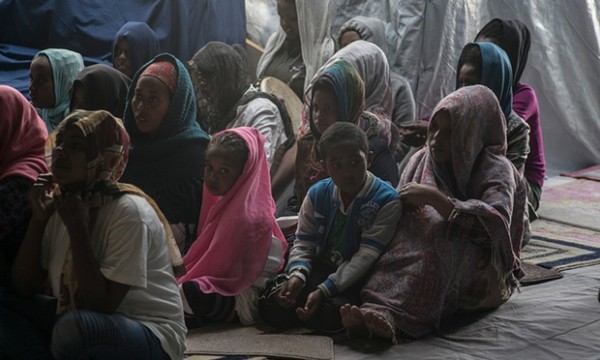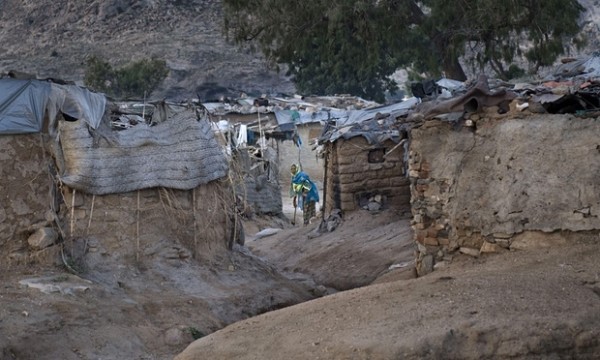PBS: Escaping Eritrea … [Read More...] about ካብ ውሽጢ ቤት ማእሰርታት ኤርትራ
Vittorio Longhi |Friday 18 December 2015 | The Guardian
If the EU were serious about tackling the human rights crisis in Eritrea, it would surely have made its financial assistance conditional on true democratic reform
After months of talks, the European commission last week announced a new five-year assistance package to Eritrea worth €200m (£145m).

Officially, those funds are to support development in the energy sector and improve governance. In fact, it looks like another move to stem the flow of Eritrean asylum seekers to Europe while letting European companies exploit the country’s natural resources.
The grant from the EU development fund, the first from Brussels to Amara since 2009, has the full agreement of the EU’s 28 member states.
In the view of Neven Mimica, the EU commissioner for international cooperation and development, the package will help to tackle the root causes of migration from Eritrea.
This year alone, the number of Eritrean asylum seekers arriving on Europe’s southern shores has exceeded 40,000 , and this is without taking into account those who die crossing the desert or the Mediterranean.
Mimica implies that Eritreans are economic migrants who flee the country because of poverty and unemployment, rather than refugees forced to escape the oppressive regime of Isaias Afwerki. In the European commission’s announcement there is little mention of the human rights crisis in Eritrea, and there is no concrete demand or condition attached to the aid package.
The EU is effectively suggesting that Eritreans don’t need to apply for asylum, disregarding the 500-page report released last June by the UN commission of inquiry on human rights in Eritrea. The report described a state of terror where the government denies basic rights and freedoms, while perpetuating compulsory and open-ended military service, forced labour, arbitrary detention and torture.
UN commissioners are now trying to establish if those violations constitute crimes against humanity. In addition, the UN security council has just extended the arms embargo on Eritrea, due to the country’s alleged support of terrorist groups in the region such as al-Shabaab.
Father Mussie Zerai, an Eritrean priest who campaigns for refugees’ rights across Europe, believes the EU should now ensure full accountability and transparency on how those resources will be used: “European taxpayers’ money should not be wasted or, worse, it could strengthen the regime, contradicting Europe’s founding principles and values,” he said.
Unfortunately, in Eritrea’s development partnership with the EU, a key principle is the “non-imposition of any political and/or economic conditionality”.
If the EU is so keen on keeping refugees away from its borders, how about compensating the regime for the loss of income deriving from trafficking? While they’re at it, they might also want to cover the resulting loss of proceeds from remittances and the extortive diaspora tax on Eritreans abroad.

However, preventing asylum seekers from fleeing is not the only potential benefit to the EU arising from the agreement. According to the statement, the €200m fund will be used in part for the energy sector, allowing more space for private investors.
New research shows that Eritrea’s Red Sea coast has “massive oil and gas reserves”, but the endless conflict with Ethiopia and the isolation of the Afwerki government have left the country’s natural resources largely untouched.
That may well be why, for example, the former UK Conservative leader Michael Howard led a group of British businessmen to seek investment opportunities in Eritrea’s hydrocarbon sector in March 2014. Lord Howard is chairman of Soma Oil and Gas , a company that has been accused of bribing Somali officials to obtain a licence to explore and extract oil offshore.
In February 2015, Eritrean officials attended the Red Sea Oil and Gas summit in Dubai, where they said they were prioritising the petroleum sector as part of the country’s economic development, promising incentives to foreign oil companies.
Even more evident are the interests of Italy in Eritrea. The country is a former Italian colony and currently a major business partner.
Last year, Lapo Pistelli, the vice-minister of foreign affairs, was criticised by human rights groups for shaking hands with Afwerki during a visit to Asmara. He claimed he was going to start new bilateral relations and bring Eritrea back to the international community “as a responsible and indispensable actor to stabilise the region”.
A few months later, Pistelli played a decisive role in involving the Eritrean government in the Khartoum process, an EU-African Union initiative aimed at tackling the trafficking of migrants between the Horn of Africa and Europe.
In June this year, Pistelli became vice-president of Italy’s oil giant ENI, already active in 15 African countries. The decision was opposed by some left-wing MPs, who accused him of a conflict of interest and suggested he might have planned the move while still in political office.
Regardless of the many accusations levelled at the dictatorship, which include violence and abuse by the government, and notwithstanding the fate of thousands of young asylum seekers who continue to flee the country, ENI provides a fairly glowing account of Eritrea.
In its webpage on the country, the company highlights mining and energy as sectors with high potential to attract foreign investment, and states that Eritrea has “some interesting oil reserves, but the exploitation licences have not been released yet”.
If the EU were serious about helping development in Eritrea and addressing the root causes of migration from the country, it would leave corporations’ interests out of the aid package. It would help to solve the border dispute with Ethiopia and make the funding conditional on true democratic reform and the respect of human rights. That would be the Europe of politics, not business.
